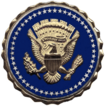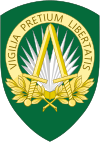General George Joulwan | |
|---|---|
 George Joulwan | |
| Born | 16 November 1939 Pottsville, Pennsylvania |
| Allegiance | United States of America |
| Service | |
| Rank | |
| Commands | |
| Battles / wars | Vietnam War |
| Awards | |

George Alfred Joulwan (born 16 November 1939, Pottsville, Pennsylvania) is a retired United States Army general who served for 36 years. He finished his military career as the Commander-in-Chief of the United States European Command and NATO's Supreme Allied Commander (SACEUR) in 1997.[1]
As the Supreme Allied Commander, he conducted over 20 operations in the Balkans, Africa, and the Middle East.[1] When the United States sent forces into Bosnia in the 1990s, General Joulwan played the leading role in troop deployment, earning praise by President Clinton upon Joulwan's retirement.[2]
As SACEUR, General Joulwan created a strategic policy for the United States military engagement in Africa, which was the first time in U.S. history that such a policy had been crafted.[1]
Military career
[edit]His efforts have built a foundation for a Europe that is safe, secure, and democratic well into the 21st century. . . . General Joulwan's leadership and wise counsel will truly be missed in the senior decision-making ranks of our national security structure.
West Point
[edit]George Joulwan earned his college degree at the United States Military Academy at West Point. At West Point, he played football and basketball, earning two varsity letters as a football lineman.[1] Later in his career, General Joulwan earned a master's degree from Loyola University (Chicago) in political science.[4]
Vietnam
[edit]General Joulwan served from June 1966 to November 1967 and from June 1971 to January 1972 in Vietnam. He attended the Army War College, and served on the Staff and Faculty until 1979. He commanded the 2nd Brigade, 3rd Infantry Division (Mechanized), from June 1979 to September 1981, when he became Chief of Staff, 3rd Infantry Division.
White House
[edit]
Joulwan served as special assistant to General Alexander Haig while still a Major within the U.S. Army, when Haig was serving as White House Chief of Staff from 4 May 1973 to 21 September 1974.[5]
National leadership
[edit]He served in various functions at the Pentagon from 1982 until June 1986, when he became the Deputy Chief of Staff for Operations, United States Army Europe and U.S. Seventh Army, Germany.
In March 1988 he was given command of the 3rd Armored Division and in 1989 he became Commanding General, U.S. V Corps.
From November 1990 until October 1993 he was Commander in Chief of United States Southern Command.
International leadership
[edit]He served as the Supreme Allied Commander, Europe (SACEUR) from 1993 to 1997, when he was succeeded by General Wesley Clark. He retired from command after serving in NATO.[6]
| Year | Assignment | Emblem | Location |
|---|---|---|---|
| 1963 | Commander in the Infantry: First Battalion, 30th Infantry, 3rd Division | 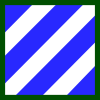 |
Europe |
| 1964 | Battalion Operations Officer (S-3): First Battalion, 26th Infantry of the First Division |  |
Vietnam |
| 1968 | Assistant professor of Military Sciences: Loyola University Chicago | Chicago, IL | |
| 1971 | 101st Airborne Division |  |
Vietnam |
| 1972 | Department of Tactics, United States Military Academy at West Point |  |
West Point, NY |
| 1973 | Aide-de-Camp to the Vice Chief of Staff of the United States Army |  |
Washington |
| 1973 | Special Assistant to the President of the United States, Richard M. Nixon |  |
Washington |
| 1975 | Special Assistant to the Supreme Allied Commander, Europe | Europe | |
| 1975 | Commander of the First Battalion of the 26th Infantry |  |
Various |
| 1977 | Student (and later staff and faculty) at United States Army War College | 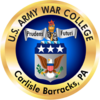 |
Pennsylvania |
| 1979 | Commanded the 2nd Brigade of the 3rd Infantry Division |  |
Germany |
| 1981 | Division Chief of Staff, 3rd Infantry Division |  |
Various |
| 1982 | Office of the Joint Chiefs of Staff |  |
Arlington, VA |
| 1983 | Director of Force Development, Department of the Army |  |
Pentagon, Washington, D.C. |
| 1985 | Deputy Chief of Staff for Operations, U.S. Army Europe and Seventh Army |  |
Germany |
| 1988 | Commander of the 3rd Armored Division | 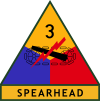 |
Various |
| 1989 | Commanding General of the V Corps |  |
Various |
| 1990 | Commander-in-Chief, United States Southern Command |  |
Panama, El Salvador and other locations |
| 1993–1997 | Commander-in-Chief, United States European Command and Supreme Allied Commander |  |
Europe, worldwide |
Post-military career
[edit]General Joulwan sits on the board of directors of Emergent BioSolutions, a biotechnology company, after a referral to the post by Allen Shofe, an executive at Emergent.[4]
His other post-military positions have included:[4]
- President of Team One, a consulting firm
- Senior Advisor of Global USA Inc, a government relations and consulting firm
- Board member for General Dynamics Corporation
- Professor at the United States Military Academy at West Point
- Member of the board of trustees for the United States Military Academy
He has also served as a military analyst for Fox News Channel. Notably, he appeared on Fox News Sunday a few weeks after 11 September 2001, with White House Chief of Staff Andrew Card and Senate Armed Forces chairman Carl Levin to discuss his experience in war planning and the American military's planning with regards to Afghanistan.[2]
Citizenship and philanthropy
[edit]General Joulwan has also served the St. Jude Children's Research Hospital as the Chair Emeritus of the Gourmet Gala Committee.[8] A public park in Pottsville, Pennsylvania was named in his honor.[9]
Personal life
[edit]General Joulwan had a twin brother, James Joseph Joulwan, who died in 2013. General Joulwan is of Lebanese heritage.[10][11] He is married and has eight grandchildren. George comes from a distinguished military family. His father fought with the US Navy in WWI, and his cousin fought with the US Army in WWII and was captured twice.
Awards and decorations
[edit]References
[edit]- ^ a b c d e Dyer, Thomas B. (14 May 2002). "2002 Distinguished Graduate Award: GEN George A. Joulwan '61". West Point Association of Graduates. Retrieved 3 June 2014.
- ^ a b "Text: Andrew Card on 'Fox News Sunday'". The Washington Post. 30 September 2011. Retrieved 3 June 2014.
- ^ "Statement on the Retirement of General George A. Joulwan, USA". The American Presidency Project. Gerhard Peters – The American Presidency Project. Retrieved 3 June 2014.
- ^ a b c "People: Emergent BioSolutions Inc (EBS.N)". Reuters. Retrieved 3 June 2014.
- ^ Haig, Alexander (1 September 1992). Inner Circles: How America Changed the World : A Memoir. Grand Central Publisher.
- ^ "Arab-Americans in the United States Military". Arab-American Business and Professional Association. 4 July 2019. Archived from the original on 11 November 2021. Retrieved 11 November 2021.
- ^ a b "Resume of Service Career of George Alfred Joulwan, General". BosniaLINK. Defense Technical Information Center, U.S. Department of Defense. Archived from the original on 20 June 2005. Retrieved 3 June 2014.
- ^ "2014 Gourmet Gala Committee". St. Jude Children's Research Hospital. Memphis, Tennessee. Archived from the original on 6 June 2014. Retrieved 3 June 2014.
- ^ "Governor Rendell Makes Investment In Pottsville; Delivers On Promise to Redevelop Downtown". Free Online Library. Huntingdon Valley, Pennsylvania: Farlex, Inc. 14 October 2005. Retrieved 3 June 2014.
- ^ "Military Hall of Honor: George Alfred Joulwan, General, U.S. Army". Militaryhallofhonor.
- ^ "Former NATO Supreme Allied Commander's Journey To His Ancestors' Lebanon". Washington Report.
- ^ "Order of the White Lion". old.hrad.cz/index_uk.html. President of the Czech Republic. Retrieved 14 July 2014.
- ^ "NATO'S EUROPEAN COMMANDER DECORATED IN HUNGARY". Friends & Partners; Linking US-Russia Across the Internet. Natasha Bulashova, Greg Cole. Retrieved 3 June 2014.
External links
[edit]- Biography at United States Military Academy
- George Joulwan historical news archives at The New York Times
- Profile at Forbes
- The General George Joulwan East Side Park in Pottsville, Pennsylvania
- "The New NATO: Building Stability, Democracy, and Peace Through Cooperation" article by General Joulwan at the Center for Strategic Decision Research
- Appearances on C-SPAN


